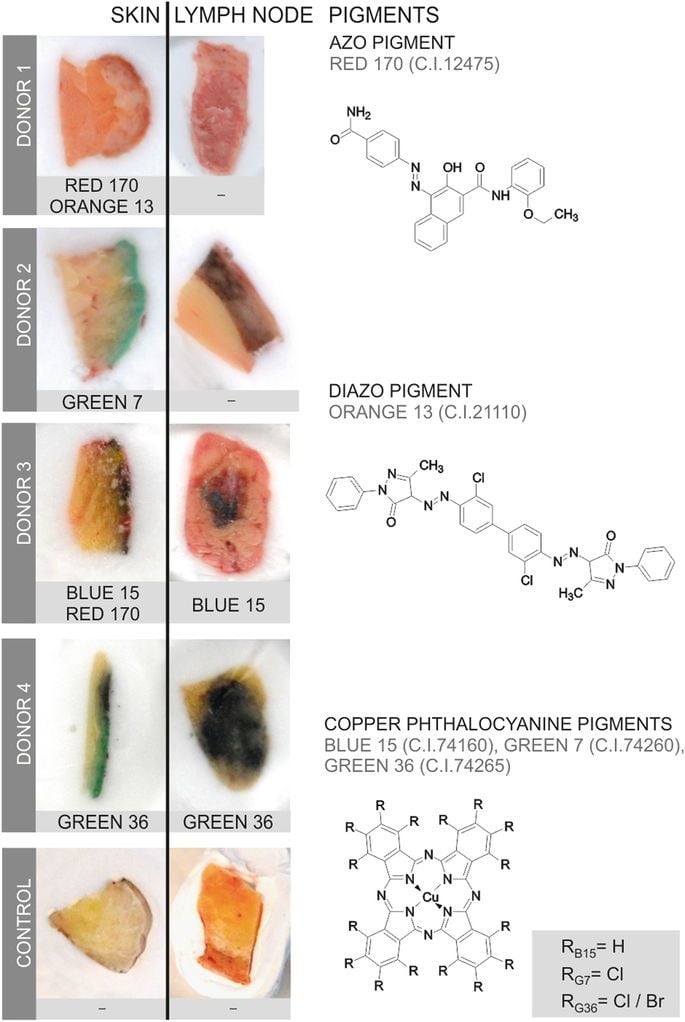Tattoo Ink May Stain Your Lymph Nodes
But more research is needed to determine whether this is actually a bad thing
/https://tf-cmsv2-smithsonianmag-media.s3.amazonaws.com/filer/5e/e8/5ee88c5f-2d8a-4638-bd75-819c0015f4a8/tatoo.jpg)
Getting a tattoo has always come with risks. There’s the possibility of an allergic reaction, infection or even diseases like hepatitis or tetanus if the equipment isn’t properly sterilized. And there's always the risk of second-day doubt about your choice of everlasting image. But a new study shows there might also be broader health consequences of getting inked. As Agence France-Presse reports, researchers have found that potentially toxic metals from tattoo ink circulates in the immune system, staining lymph nodes.
Researchers examined lymph nodes and skin samples from deceased donors, four with tattoos and two that never got inked, writes Ryan F. Mandelbaum at Gizmodo. They found stained lymph nodes in two of the subjects, one with blue ink and one with green. The nodes as well as the skin showed elevated levels of metals including aluminum, chromium, iron, nickel and copper. In one of the donors nodes, cadmium and mercury, both highly toxic, were detected. The research appears in the journal Scientific Reports.
“When someone wants to get a tattoo, they are often very careful in choosing a parlor where they use sterile needles that haven’t been used previously,” Hiram Castillo-Michel, one of the study’s authors says in a press release. “No one checks the chemical composition of the colors, but our study shows that maybe they should.”
To identify the nano-particles that made it into the lymph nodes, Castillo-Michel and other researchers at the European Synchrotron Radiation Facility in Grenoble subjected the tissue to X-ray fluorescence analysis to identify the foreign particles in the nodes and Fourier transform infrared spectroscopy to see any biomolecular changes in the tissue surrounding the tattoo-stained molecules, reports AFP.
According to the press release, such contamination could lead to a chronic enlargement of the lymph nodes and lifelong exposure to the potentially toxic compounds. While they did find strong evidence that the pigments cause changes leading to inflammation, the study did not focus on whether the ink caused any particular health effects. That’s something the team hopes to investigate in a follow up.
Wolfgang Bäumler from University Hospital Regensburg in Germany, not involved in the study, tells Mandelbaum that the research confirms what he’s found in his own work. He explains at Deutsche Welle that many of the pigments used in tattooing were created for industrial use, and are repurposed by tattoo ink companies, but were never tested for safety.
“The substances used to create these lasting and high-contrast tattoos were developed for printers and cars,” Bäumler tells DW. “And the chemistry remains the same… If somebody asks me whether it's dangerous to have a tattoo, all I can say is, We don't know yet.”
A previous study suggested that getting inked can actually impact the immune system, Sabrina Stierwalt at Scientific American reported last year. According to that research, tattoo virgins getting their first ink saw their Immunoglobin A, an antibody that fight infections, fall. Those getting their second or third tats, however, got an IgA boost. The effects, however, were short-lived and it’s not clear if the drop in IgA was due to stress from the first dance with the needle or some other factor. And contrary to the headlines that study spawned, tattoos will not help you ward off the common cold.
